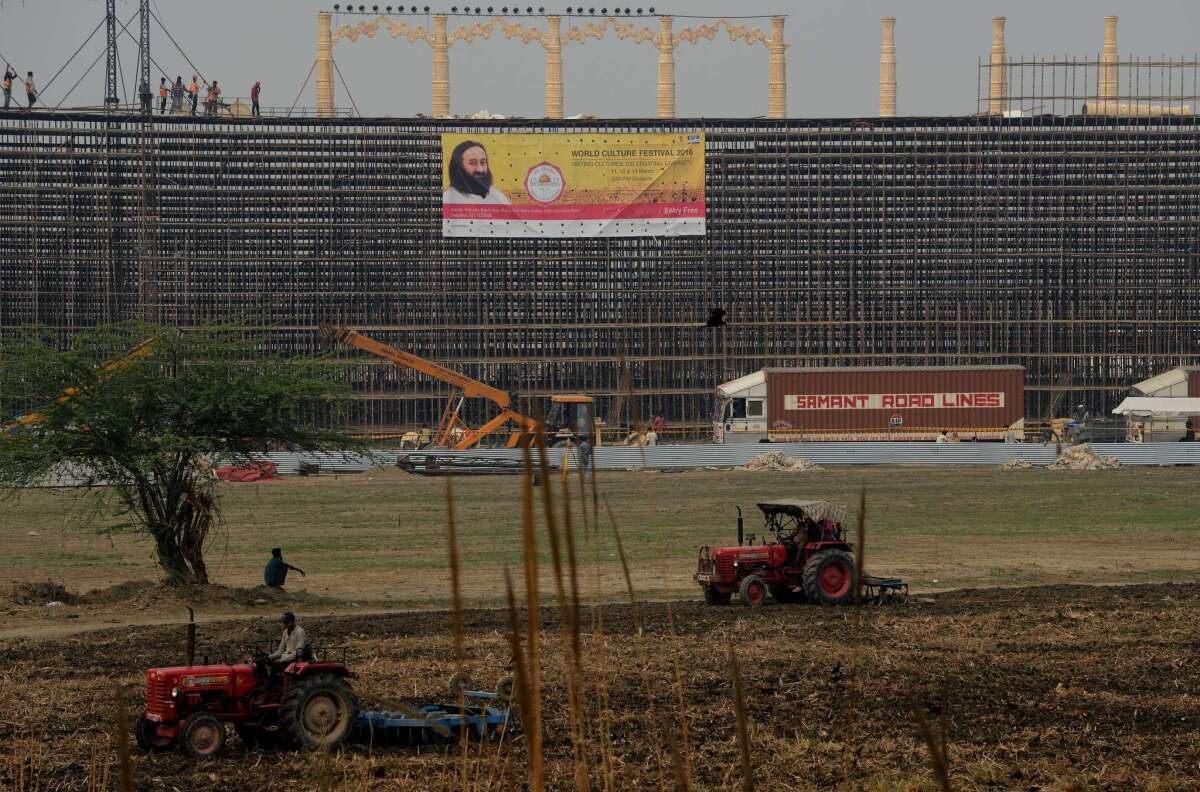Spiritual guru’s festival in India to go ahead despite environmental concerns

Laborers take part in construction work on the banks of the Yamuna River in New Delhi on March 1.
Environmental groups say an event planned in India this weekend by a spiritual guru will destroy the fragile ecosystem of the Yamuna River, a beleaguered waterway already under threat from nearby construction and waste.
Dozens of farmers have gone on a hunger strike to protest the effect on their land. The Indian army was called in to construct a floating bridge across the river.
But Sri Sri Ravi Shankar, who founded the Art of Living Foundation in 1981, said Thursday that he plans to go ahead with a three-day festival that is expected to draw throngs of devotees to the troubled flood plain outside India’s capital, New Delhi, despite risks of environmental damage.
Shankar was defiant, saying he would rather be imprisoned than pay a $750,000 fine issued by the National Green Tribunal, an Indian environmental court.
“We have not done anything wrong,” he said. “We have been taintless and will remain so. We will go to jail but not pay a penny.”
Shankar has won followers around the world for his message of nonviolence and spiritual wellness and for his practice of rhythmic breathing known as Sudarshan Kriya.
Organizers say the World Culture Festival is set to bring 37,000 artists to sing, dance and meditate on a custom-built stage about the size of six soccer fields — all to commemorate 35 years of Shankar’s foundation.
The Yamuna, one of India’s longest rivers, is revered in Hinduism and an important source of water for the fast-growing capital, but in recent years has appeared more like a stinking drain filled with waste. Critics worry that the Art of Living event would be the final blow to a dying waterway.
The court chastised the central government and state pollution board for not intervening sooner, saying that “flood plains have been drastically tampered with, the natural flow of the river has been destroyed and reeds, grasses and natural vegetation on the riverbed have been removed” by construction. Organizers have built two pontoon bridges, trimmed trees, laid down concrete over parts of the flood plain and trampled vegetation.
The court also said that although the festival had obtained permission to erect temporary structures on 60 acres, the area being used was more than double that size.
In addition to the fine, the tribunal this week ordered organizers to undo the damage — which would cost millions more dollars than the fine — but said it was too late to stop the event from taking place.
The festival had the backing of top politicians, had secured contributions of about $330,000 from the Culture Ministry and was scheduled to be opened Friday by Prime Minister Narendra Modi.
Activists say the episode has demonstrated the influence that Shankar and other so-called godmen have over public life in India.
“The flood plain needs hundreds of years to develop its own ecosystem,” said environmental activist Vimlendu Jha. “It has been destroyed by Art of Living by leveling the entire place, without adequate permission. It is a visual commentary on what our godmen are and what the state of government is.”
Activists questioned why the tribunal pilloried the organizers and government but did not call off the event.
“The take-away is: Organize the event but pay money,” Jha said.
Indian President Pranab Mukherjee withdrew his participation, reportedly because of the controversy. Culture Minister Mahesh Sharma defended the government’s contribution to the festival, saying the government “routinely supports events that promote tourism and culture” and the organizers “have not done anything illegal or in [a] clandestine manner,” the NDTV news network reported.
Parth M.N. is a special correspondent.
More to Read
Start your day right
Sign up for Essential California for news, features and recommendations from the L.A. Times and beyond in your inbox six days a week.
You may occasionally receive promotional content from the Los Angeles Times.






